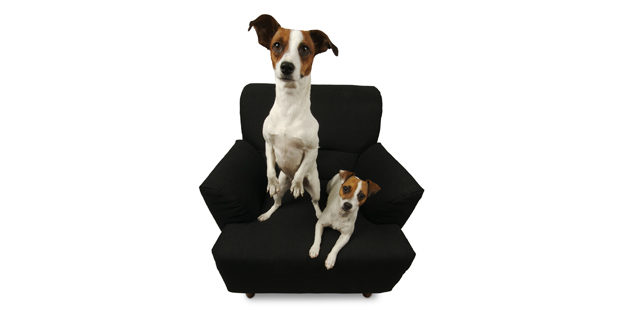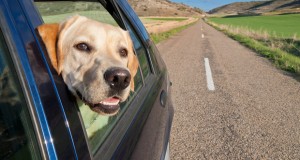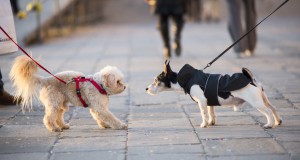by Alana Stevenson, MS
Author, Training Your Dog the Humane Way
The holidays are quickly approaching. You may be worried about your canine crew mixing with friends and relatives for festive get-togethers—with a little planning and preparation the holidays can be more enjoyable for all.
Doorway etiquette. Teach your dog polite manners at the doorway.
Choose a place for your dog to go to when you open the door. This location should be no more than ten to fifteen feet away from the door. You can put a small rug down so your dog will have a visual placemat. Teach your dog to go to this place and to wait on cue as you walk to the door to open it for guests. Alternatively, you can teach your dog to back away from the door and then wait as you open it. Close the door, go back to your dog, reward, and release him.
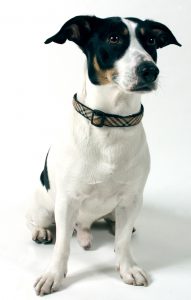 Desensitize your dog to knocks at the door and the doorbell. Recruit a friend to help. When your friend knocks on the door, say your dog’s name, make a peppy attention-getting noise such as “Hey,” or make a clicking noise with your tongue. Lure your dog with yummy food so he turns away from the door and looks at you. Reward him for looking at you. Repeat this until your dog looks at you easily when you call him after he hears a knock at the door.
Desensitize your dog to knocks at the door and the doorbell. Recruit a friend to help. When your friend knocks on the door, say your dog’s name, make a peppy attention-getting noise such as “Hey,” or make a clicking noise with your tongue. Lure your dog with yummy food so he turns away from the door and looks at you. Reward him for looking at you. Repeat this until your dog looks at you easily when you call him after he hears a knock at the door.
Now practice welcoming guests. Have a friend or relative knock on the door. Be positive as you get your dog’s attention. Lure him away from the door. Say “Wait,” as you show him a hand signal (flat open palm facing towards him), and open the door for the guest. If your dog breaks position or bolts forward, close the door and start over or have the guest turn her back on your dog and ignore him. Lure your dog away from the door again and instruct him to wait. Do not physically touch or grab your dog. Release your dog after a few seconds of waiting so he can greet your guest or direct his attention to another activity such as getting a toy. Your guest can then give your dog attention.
End training sessions on a positive note, before your dog bores or tires of the exercise. Release him with a clear signal when you take breaks or are done with training sessions. Pet him and say “Good, all done!” or “Good job, finished!”
Get a toy bin. Dogs love them. Get a wide shallow sweater box. Fill it up with toys. Put the bin in a location so your dog will see and find it easily. Your dog should have access to his toys at all times. Rotate toys to keep them interesting. Don’t leave toys scattered on the floor. Whenever your dog gets a toy from the bin, praise and play with him. A toy bin makes it easier for your dog to learn what is permissible for him to chew on and what isn’t. A toy bin encourages him to play with his toys, instead of your guest’s sneakers or presents under the Christmas tree.
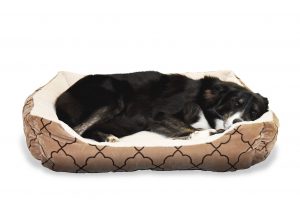 Provide comfy dog beds. If you allow your dogs on the sofa, think about logistics when guests are over. If you have only a few guests and a lot sofa room, put a throw or blanket on an area of the sofa or chair where you want your dogs to settle. If you don’t want your dogs on furniture, provide them plush dog beds instead. Sit on the floor with your dogs when you watch tv, or brush or massage them when they lie on their beds. Make their beds rewarding and enjoyable for them.
Provide comfy dog beds. If you allow your dogs on the sofa, think about logistics when guests are over. If you have only a few guests and a lot sofa room, put a throw or blanket on an area of the sofa or chair where you want your dogs to settle. If you don’t want your dogs on furniture, provide them plush dog beds instead. Sit on the floor with your dogs when you watch tv, or brush or massage them when they lie on their beds. Make their beds rewarding and enjoyable for them.
Don’t reward begging. Feed your dogs a hearty meal before or at the same time as everyone sits down for dinner, or give your dogs something fun to chew on so they stay busy. This prevents begging. Begging is a behavior. It has nothing to do with the food that you give to your dogs. Giving your dog a tiny morsel of something delicious when he is two inches from your plate staring at you creates begging. It is equivalent to giving a person half a potato chip while you eat the whole bag. When you give food to your dog, give him a decent portion, and give it to him when he is relaxed, sitting, calm, or ignoring you.
Teach guests. Teach guests how to behave too. Instruct them to pet your dog on his chest and under his head, as opposed to petting him directly on top of his head or reaching and leaning over him. All dogs respond well to calming body language. Guests should sit, stand, or kneel next to your dog or at a perpendicular angle to him as they give him attention. Your dog will feel safer, more relaxed, and will be less likely to jump. People can smile and look at your dog, but they shouldn’t stare.
Exercise your dogs. Exercise your dogs in the morning, and take frequent walks throughout the day to relax your dogs, burn off energy, and de-stress. Group walks are a good way for guests and dogs to enjoy each other’s company.
Remember, pets celebrate holidays too. Make sure they get presents, and if you celebrate Christmas, be sure your animal friends have their own stockings.
Visit www.AlanaStevenson.com for more animal behavior and training information or to book a consultation.
About the Author
Alana Linsay Stevenson, M.S. is a professional animal behavior specialist and dog trainer. She has a Master of Science in Biology Education and a bachelor’s degree in Biology. She has been helping dog and cat owners resolve their pets’ behavioral problems since early 2003.
Alana is a certified Fear Free Professional and certified in Low Stress Handling for Dogs and Cats. She is on the Cat-Friendly Practice Advisory Council for the American Association of Feline Practitioners, and is the author of two books on humane dog training and behavior modification: The Right Way the First Time: Teaching Your Dog Kindly & Humanely (2007) and Training Your Dog the Humane Way: Simple Teaching Tips for Resolving Problem Behaviors and Raising a Happy Dog (2011).
 Dog Living A lifestyle magazine for dog lovers
Dog Living A lifestyle magazine for dog lovers

